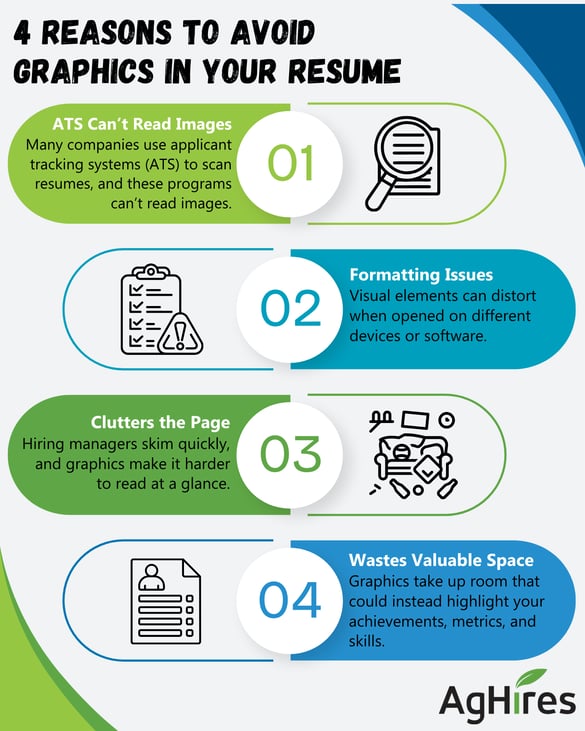
In agriculture, information is critical. From running equipment to planting crops or keeping livestock records, oftentimes, the more information you have, the better the outcome. But when it comes to resumes, this isn’t always the case. Just as important as what to include on your resume is what NOT to include.
Personal Details
There are lots of rules ag recruiters and hiring managers must follow to abide by anti-discrimination laws, and there are a few personal details you can leave off your resume to make their jobs easier. A potential employer does not need to know how old you are, your marital status, religious beliefs, political affiliations, ethnicity or health status. In fact, if you include those things, your resume may get thrown out purely out of fear of pushing the limits of those discrimination laws that are actually in place to protect you.
Photos and Graphics
That applies to images, too. Even a headshot can give away too much personal information. Not to mention, many employers now use ATS – applicant tracking systems. It’s software that helps manage the recruitment and hiring processes by organizing information into a searchable database. These systems do not recognize photos well, nor do they handle graphics, colorful text, or complex fonts. Make sure your resume is legible and image-free to maximize your visibility in an ATS.

Unprofessional Email Addresses
Many of us have email addresses from before our time pursuing careers, and some of them are absolutely suitable to put on your resume. If they’re up-to-date, regularly monitored and are professional, it’s okay to include. However, if your email address resembles “horsegirl1999” or “basketballboy01,” it’s time for a new email address to help in your ag job search. Create a new email with some variation of your first and last name – something like firstname.lastname@gmail.com – and use it for job search-related communications and documents. And don’t forget to check it regularly!
Outdated Information
Similarly, you should consider leaving your high school resume items behind—especially if you’ve pursued education beyond that point. If you have more recent educational achievements, work experience, or community involvement since graduating, those should take precedence over anything from your high school years.
The same applies if you have over 15 years of experience. If you’ve had lots of jobs and experiences in 15 years, just include those most recent. But if you’ve been in the same job for the last 10 years and the one prior for five, it’s okay to include what came before. Use your best judgement to include only what is timely and relevant.
Career and Salary Objectives
Although your career objectives will almost definitely come up in the interview, there’s really no need to include it on your resume. So instead, write a summary. Find a way to encapsulate the qualities and skills that qualify you and the goal you’re trying to reach in a few short words. Read “How to Sell Yourself on a Resume Successfully” to learn more. Here’s an example:
“Dynamic agricultural systems management professional with a strong foundation in precision agriculture and a passion for integrating technology to enhance farming practices.”
Similarly, avoid mentioning your current or desired salary on your resume. Doing so can either deter potential employers or lead you to undervalue yourself. Either scenario will work against you in the long run. Save salary discussions for once the ag recruiter brings it up in the interview process.
Slang and Nonessentials
Finally, don’t use any language that is unclear or include information that is unnecessary. Slang is unprofessional, and even jargon – which the agriculture industry loves – can make a resume, and thus, your qualifications, more difficult to digest. And don’t talk about skills or experiences that don’t have anything to do with your goal in the ag job search. So, you’re a champion in your local bowling league? That’s great! But what does it have to do with your desire to be a vet tech? Keep both your language and your content pointed and pertinent to your agriculture job search.

If these tips made you realize it’s time for a resume revamp, or you’re in need of a resume altogether, check out “Your Ultimate Resume Guide” to get started, and don’t forget what NOT to share! For more expert job search and career tips, visit our Career Advice Blog. When you’re ready to find your next opportunity, explore thousands of jobs at AgHires.com.






